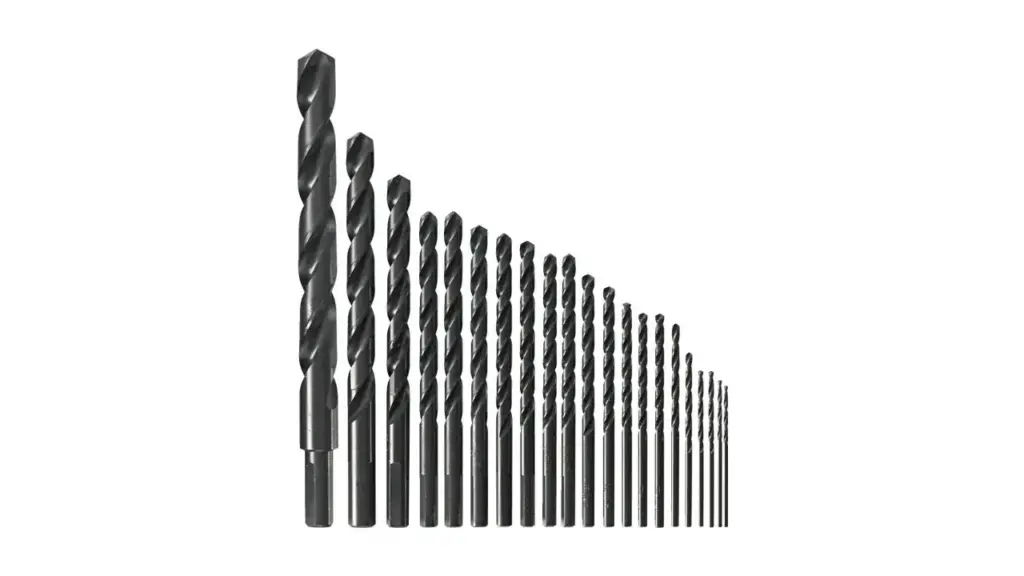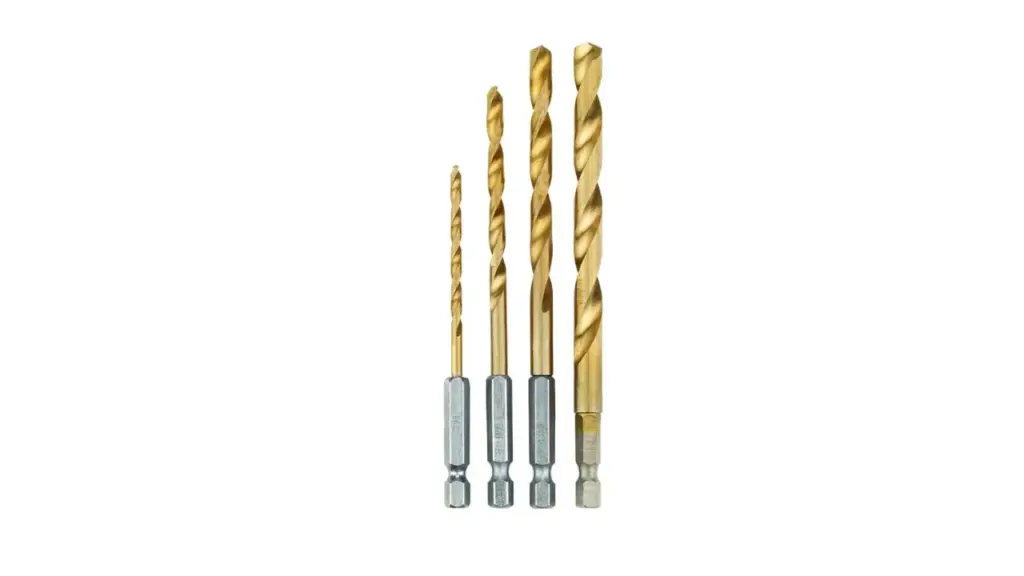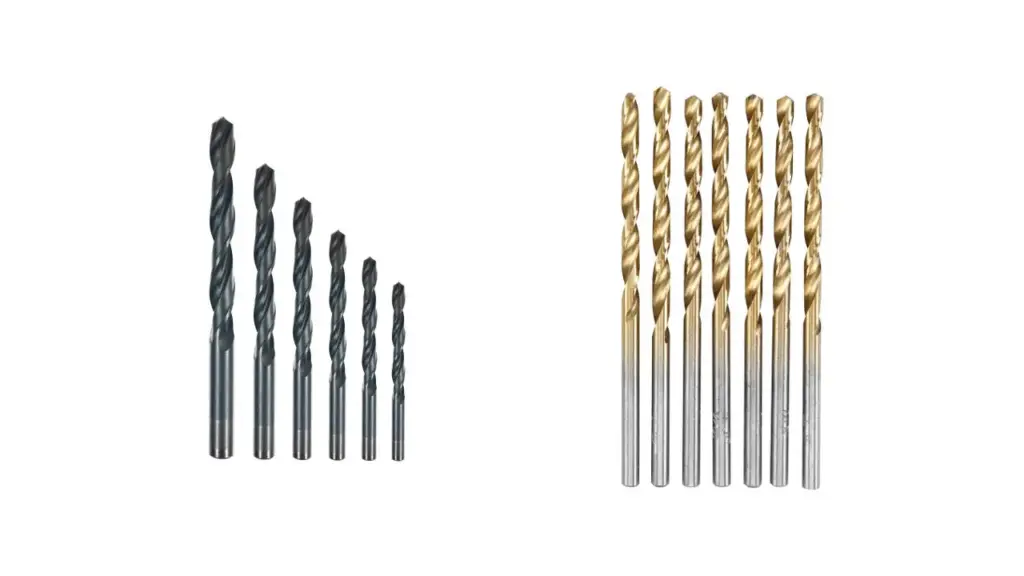Choosing the right drill bit is crucial for any drilling task, and understanding the differences between black oxide and titanium drill bits is essential. Both types offer distinct advantages and are suited for different applications. Black oxide bits are a common, more affordable option for general use, while titanium-coated bits boast enhanced hardness and reduced friction.
This blog post will delve into the key distinctions between black oxide and titanium drill bits, examining their material composition, performance capabilities across various materials, cost considerations, and overall longevity. By highlighting these differences, you’ll be better equipped to select the optimal drill bit for your specific needs, ensuring efficient and effective drilling results.
What are Black Oxide Drill Bits

Black oxide drill bits are high-speed steel (HSS) drill bits that have undergone a surface treatment process where the heated bit is exposed to steam and chemicals, forming a thin, black iron oxide layer.
This coating provides several benefits, including increased resistance to corrosion, improved lubricity which reduces friction during drilling, and a slight reduction in heat buildup compared to uncoated HSS bits. As a result, black oxide drill bits are a popular and cost-effective choice for general-purpose drilling in softer materials like wood, plastic, and non-ferrous metals such as aluminum and copper.
What are Titanium Drill Bits

Titanium drill bits are high-speed steel (HSS) bits that have been coated with titanium nitride (TiN), a hard ceramic compound often recognized by its distinct gold color. This coating significantly enhances the drill bit’s surface hardness, reduces friction, and increases heat resistance compared to standard HSS bits.
As a result, titanium drill bits offer improved durability and can maintain their sharpness for a longer period when drilling through materials like wood, plastic, and softer metals such as aluminum and copper, making them a good general-purpose option for various drilling tasks.
Black Oxide vs Titanium Drill Bits

Selecting the right drill bit is a fundamental aspect of any drilling task, influencing both efficiency and the quality of the final result. Black oxide and titanium drill bits are two commonly encountered options, each presenting a unique set of characteristics and benefits. Black oxide bits are known for their affordability and suitability for general-purpose drilling, while titanium-coated bits offer enhanced hardness and reduced friction, leading to improved performance in a wider range of materials.
Understanding the nuances of their material composition, performance capabilities, cost-effectiveness, and longevity is crucial for making an informed decision tailored to your specific drilling needs. This detailed comparison will explore these key aspects to help you determine which type of drill bit is the better choice for your projects.
Material and Coating
Black oxide drill bits are manufactured from high-speed steel (HSS) that has undergone a chemical treatment to create a thin, black oxide layer on the surface. This process enhances the bit’s corrosion resistance and provides a slight improvement in lubricity, which helps reduce friction during drilling. However, the black oxide layer is relatively thin and does not significantly increase the bit’s inherent hardness or heat resistance beyond that of the base HSS material. These bits are a cost-effective option for general-purpose drilling.
Titanium drill bits, in contrast, are also typically made from HSS but are distinguished by a thin, hard coating of titanium nitride (TiN). This coating is significantly harder than black oxide and substantially reduces friction between the bit and the workpiece. The titanium nitride layer helps the bit maintain a sharper cutting edge for a longer period, especially when drilling into a broader range of materials compared to black oxide bits. While the core material is still HSS, the coating provides a notable upgrade in performance and durability for many applications.
Performance and Application
Black oxide drill bits perform well when drilling into softer materials such as wood, plastic, and non-ferrous metals like aluminum and copper. They are also suitable for light-duty drilling in mild steel. However, their relatively lower heat resistance and hardness cause them to dull more quickly when used on harder metals. For demanding applications involving tough materials, black oxide bits may not be the most efficient or long-lasting choice.
Titanium drill bits offer enhanced performance across a wider spectrum of materials, including hardwoods, fiberglass, PVC, and various types of steel. The reduced friction and increased surface hardness allow for smoother and more efficient drilling, often at higher speeds than recommended for black oxide bits. While not ideal for extremely hard metals like stainless steel (for which cobalt bits are generally preferred), titanium-coated bits represent a significant improvement over black oxide for many common drilling tasks.
Cost and Longevity
Black oxide drill bits are generally more affordable than titanium drill bits, making them an attractive option for budget-conscious users and those with occasional drilling needs. However, their shorter lifespan when used on harder materials can lead to more frequent replacements, potentially increasing the overall cost in the long run for certain applications.
Titanium drill bits have a higher initial cost due to the application of the titanium nitride coating. However, their increased durability and ability to maintain sharpness for a longer period often translate to a better long-term value, especially for users who frequently drill a variety of materials. The extended lifespan reduces the need for frequent replacements, offsetting the higher initial investment for many users.
Here is a chart showing you the difference between black oxide and titanium drill bits in the following:
| Feature | Black Oxide Drill Bits | Titanium Drill Bits |
| Material | HSS with a black oxide surface finish | HSS with a Titanium Nitride (TiN) coating |
| Heat Resistance | Low | Moderate, due to the coating |
| Hardness | Basic HSS hardness | Increased surface hardness due to coating |
| Friction | Moderate | Low due to the coating |
| Best For | Soft wood, plastic, non-ferrous metals, light use | Wood, most metals, general-purpose drilling |
| Durability | Lower lifespan, especially on harder materials | Longer lifespan than black oxide for many materials |
| Cost | Least expensive | Moderately expensive |
| Resharpening | Generally easier to resharpen effectively | Resharpening can remove the titanium coating, reducing benefits |
Black Oxide vs Titanium vs Cobalt Drill Bits
Choosing the right drill bit is a critical decision that impacts drilling efficiency, hole quality, and the longevity of the bit itself. Black oxide, titanium-coated, and cobalt drill bits are three common types, each engineered with distinct properties and intended for different applications.
- Black oxide bits are the most economical and suitable for general-purpose drilling in softer materials. Titanium-coated bits offer enhanced surface hardness and reduced friction for improved performance in a wider range of materials.
- Cobalt drill bits stand out for their superior heat resistance and inherent hardness, making them the ideal choice for demanding tasks involving hard and abrasive materials.
Understanding the nuances of their construction, performance, cost, and durability is essential for selecting the optimal drill bit for your specific needs. This comprehensive comparison will delve into these key aspects to guide you in making an informed decision.
Material and Coating
Black oxide drill bits are manufactured from high-speed steel (HSS) that undergoes a chemical treatment to create a thin, black oxide layer on the surface. This coating provides mild corrosion resistance and slightly improved lubricity, which helps reduce friction during drilling. However, it does not significantly increase the bit’s hardness or heat resistance, as these properties are determined by the underlying HSS. Black oxide bits are the most cost-effective option for general-purpose drilling.
Titanium drill bits are also typically made from HSS but are distinguished by a thin, hard coating of titanium nitride (TiN). This gold-colored coating significantly increases the surface hardness of the bit and reduces friction between the bit and the material being drilled. As a result, titanium-coated bits tend to stay sharper for longer than black oxide bits when drilling materials like wood, plastic, and softer metals. However, the coating is only a surface treatment, and the core material remains standard HSS, offering moderate heat resistance. Once the coating wears off, the bit’s performance will be similar to that of an uncoated HSS bit.
Cobalt drill bits differ fundamentally as they are constructed from an HSS alloy containing 5% to 8% cobalt throughout the entire bit. This integral alloying provides uniform hardness and exceptional heat resistance compared to both black oxide and titanium-coated bits. The presence of cobalt allows these bits to maintain their cutting edge sharpness even at high temperatures generated when drilling through very hard and abrasive materials. Unlike coated bits, the performance benefits of cobalt are inherent to the material itself, ensuring consistent performance even after resharpening.
Performance and Application
Black oxide drill bits are best suited for drilling softer materials such as wood, soft plastics, and non-ferrous metals like aluminum and copper. They can handle light-duty drilling in mild steel but may dull relatively quickly under continuous use or when encountering harder metals. They are a practical choice for basic DIY tasks and general drilling needs where extreme durability or cutting power is not required.
Titanium drill bits offer improved performance over black oxide bits in a broader range of materials, including hardwoods, fiberglass, PVC, and various types of steel. The reduced friction and increased surface hardness facilitate smoother and more efficient drilling, extending the bit’s lifespan compared to black oxide in these applications. They represent a good middle ground for users who need more durability than black oxide but may not frequently work with extremely hard metals.
Cobalt drill bits are specifically engineered for drilling hard and tough materials like stainless steel, cast iron, titanium alloys, and hardened steel. Their superior heat resistance prevents premature dulling and allows for higher drilling speeds in these challenging materials. They are the preferred choice for professionals in metalworking, machining, and construction who frequently encounter demanding drilling applications where other types of bits would quickly fail.
Cost and Longevity
Black oxide drill bits are the most budget-friendly option initially, making them accessible for a wide range of users. However, their shorter lifespan, especially when used on harder materials, may lead to more frequent replacements, potentially increasing the overall cost in the long run for demanding tasks.
Titanium drill bits are typically more expensive than black oxide bits but offer a better balance of performance and cost for general-purpose drilling. Their increased durability due to the titanium coating can extend their lifespan compared to black oxide bits, making them a worthwhile investment for many DIYers and light industrial users.
Cobalt drill bits represent the highest initial investment among the three types. However, their exceptional durability and ability to effectively drill hard materials often result in a longer service life, especially in professional or heavy-duty applications. The reduced need for frequent replacements and the ability to tackle tough jobs efficiently can make cobalt bits the most cost-effective choice in the long term for users who frequently work with challenging materials.
| Feature | Black Oxide Drill Bits | Titanium Drill Bits | Cobalt Drill Bits |
| Material | HSS with a black oxide surface finish | HSS with a Titanium Nitride (TiN) coating | HSS alloyed with 5-8% Cobalt throughout |
| Heat Resistance | Low | Moderate, coating helps reduce heat | Excellent, maintains sharpness at high temperatures |
| Hardness | Basic HSS hardness | Increased surface hardness due to coating | High, uniform hardness throughout the bit |
| Friction | Moderate | Low due to the coating | Moderate |
| Best For | Soft wood, plastic, non-ferrous metals, light use | Wood, most metals, general-purpose drilling | Hard metals (stainless steel, cast iron, titanium alloys) |
| Durability | Lower lifespan, especially on harder materials | Longer lifespan than black oxide, coating can wear off | Longest lifespan in demanding, high-heat applications |
| Cost | Least expensive | Moderately expensive | Most expensive |
| Resharpening | Standard HSS performance after resharpening | Standard HSS performance after coating wears off | Retains performance characteristics after resharpening |
Are Black Oxide Drill Bits Better Than Titanium
The superiority of black oxide over titanium drill bits isn’t absolute; it depends on the intended application and user priorities. Black oxide drill bits are generally more budget-friendly and perform adequately for drilling into softer materials like wood, plastics, and non-ferrous metals.
Their black oxide coating offers a degree of corrosion resistance and improved lubricity. Furthermore, due to the nature of the coating, black oxide bits are often considered easier to resharpen effectively, potentially extending their usable life for appropriate tasks.
Titanium drill bits, with their titanium nitride (TiN) coating, boast increased surface hardness and reduced friction. This translates to a longer-lasting sharp edge, particularly when drilling into a wider range of materials, including harder woods and some metals like aluminum and mild steel. The titanium coating also provides better heat resistance compared to black oxide.
However, once the titanium coating wears off, the bit’s performance diminishes, and resharpening can remove the coating, negating its benefits. Therefore, the “better” choice hinges on the balance between initial cost, the hardness of the materials being drilled, and the importance of prolonged sharpness versus ease of resharpening.
Black Oxide or Titanium Drill Bits for Metal
When choosing between black oxide and titanium drill bits for metal, consider the type and hardness of the metal you’ll be working with. Black oxide drill bits are a more economical option suitable for drilling softer metals like aluminum, copper, brass, and mild steel. The black oxide coating offers some lubricity and corrosion resistance, making them adequate for general-purpose use on these materials and for occasional drilling tasks.
Titanium drill bits, with their titanium nitride (TiN) coating, offer enhanced surface hardness and reduced friction, making them a better choice for drilling harder metals and for more demanding or frequent use. The titanium coating helps the bit stay sharper for longer and can withstand higher drilling speeds and heat buildup compared to black oxide bits when working with metal. However, for very hard metals like stainless steel or hardened steel, neither black oxide nor standard titanium-coated bits are ideal; cobalt drill bits are generally recommended for these tougher applications.
Here’s a quick guide:
- Soft Metals (Aluminum, Copper, Brass): Black oxide or titanium can work well. Titanium may offer longer sharpness.
- Mild Steel: Both can be used, but titanium will likely provide better performance and longevity.
- Hard Metals (Stainless Steel, Hardened Steel): Neither is ideal; cobalt drill bits are recommended.
Ultimately, the best choice depends on the specific metal you are drilling, the frequency of your drilling tasks, and your budget.
Conclusion
In summary, black oxide drill bits offer a cost-effective solution for general-purpose drilling in softer materials, providing basic corrosion resistance and lubricity. Titanium drill bits, with their harder coating and reduced friction, offer improved performance and longevity for a wider range of materials, including some harder metals.
The choice between black oxide and titanium drill bits hinges on your primary drilling needs and budget. For occasional use on softer materials, black oxide bits are sufficient. However, for frequent drilling or work with tougher materials, the enhanced durability and performance of titanium-coated bits make them a worthwhile investment.
When sourcing wholesale drill bits from us, consider offering both black oxide and titanium options to cater to diverse customer needs. Black oxide serves the budget-conscious and general user, while titanium provides an upgrade for enhanced performance and longer tool life.


